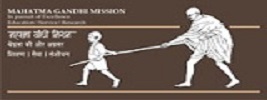Dr. Ashwini Kale
Qualification : BPTh, MPT (neurosciences )
Associat†Professor
ashwinikalept@yahoo.co.in
Areas of Interest:  - Neurosciences,
Pediatric Rehabilitation
Publication:    01 (International)
Academic Role and Responsibilities
- Head of the Department of Neuro physiotherapy
- Neuro physiotherapy Subject Incharge
- Third Year BPT class Incharge
Subjects Teaching
Subject                                                                          Academic Year |
Functional Diagnosis and physiotherapeutic skills III BPT |
Physiotherapy in Neuroscience IV BPT |
ACADEMIC QUALIFICATIONS
Post Doctural Degree |
PhD |
Year of Complition |
2019 |
Degree |
MPT(Neurosciences ) |
Institute |
|
Year of Passing |
2013 |
Degree |
BPTh |
Institute |
Pragathi   college of Physiotherapy, nizamabad |
Year of Passing |
2010 |
EXPERIENCE                 
Institute |
MGM’s Institute of Physiotherapy |
Designation |
Associate Professor |
Tenure |
2018 till date |
|
|
Institute |
MGM Institiute of Physiotherapy |
Degination |
Assistant Professor |
Tenure |
2013-2018 |
AREAS OF INTEREST, EXPERTISE AND RESEARCH
Areas of Interest:¬† Rehabilitation in geriatric, neurological & pediatric conditions, women’s health
Areas of expertise: geriatric conditions, stroke rehabilitation, cerebral palsy
Areas of research: postnatal physiotherapy, recent advances in neurophysiotherapy, paediatric rehabilitation
PROFESSIONAL AFFILIATIONS AND CONTRUBATIONS
- Maharashtra Occupational and Physiotherapy  Council
- Indian Association of Physiotherapy
Workshops, Conferences Participation and Organization
- Workshop-Cognitive Rehabilitation, physiotherapy perspective, under Dr. Hamza N.G-MGM Hospital, Aurangabad, 19 Jan 2011(6 credit hours)
- State level workshop on motor relearning programme and basic concepts of mckenzie approach, nizamabad, 25th to 26th july 2009
- Workshop on cognitive rehabilitation, Aurangabad, 19th jan 2011
- Certified childbirth educator course, Mumbai 5th to 7th oct, 2012
- Certified manual therapist course 7th to 9th feb 2014
- Certified aerobic, pilates instructor course 15th feb to 19th feb 2016
Awards and Honors
- Awarded “Signaificant contribution Award” in 54th annual conference of IAP.
Publications
- Effect of forward and backward walking on aerobic capacity and endurance (International Journal of Recent Trends in Science and Technology)Ashwini Kale, Sunita Chavan
- Effect of Constraint Induced movement therapy versus Bimanual Task Training for Improvement of Motor hand Function in Stroke Patients (Indian Journal of Physiotherapy and Occupational Therapy) Ashwini A Kale, Veda Kekatpure, Nikhila Mahendrakar
- Effect of Backward Walking Training on Gait Parameters of Stroke Patients (Indian Journal of Physiotherapy and Occupational Therapy) Ashwini A Kale, Pallavi R Manathkar, Sonali K Vispute
- Effect of core stabilization exercises in postnatal women with lumbopelvic instability ((Indian Journal of Physiotherapy and Occupational Therapy) Ashwini A Kale, Nawaj M Pathan
- Awareness about Exclusive Role of Postnatal Physical Therapy: A Preliminary Survey Conducted on Obstetricians at Aurangabad, Maharashtra (Indian Journal of Physiotherapy and Occupational Therapy) Ashwini A Kale, Bharati Bellare
Students Research Project
- Effect of forward and backward walking on aerobic capacity and endurance
- Prevalence of diastasis recti among primiparous women
- Effect of Constraint Induced movement therapy versus Bimanual Task Training for Improvement of Motor hand Function in Stroke Patients
- Effect of Backward Walking Training on Gait Parameters of Stroke Patients
- Effect of core stabilization exercises in postnatal women with lumbopelvic instability
- Comparison between effect of mirror therapy and CIMT on upper extremity motor function in subacute stroke patients.
- Comparison between Rhythmic Auditory Stimulation and Dual Task training on gait and balance in subacute stroke patients
- Comparison between effect of wii fit balance training and conventional balance training on balance and functional ability in parkinson’s disease
.

